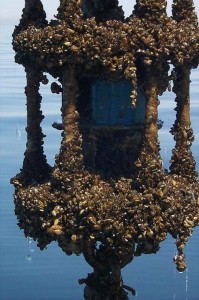The End of Days will apparently boil down to a death match between the cockroach and the zebra mussel.
I’d put my money on la cucaracha, but these zebra mussels sound like a tough bunch. And since global warming will presumably create rising tides, massive floods, and the disappearance of land (see Waterworld), maybe only the zebra mussel (and Kevin Costner) will survive.
The little bastards (the mussels, not Costner) have finally made their way to these parts.
It wouldn’t be so bad if they were edible, but experts such as researchers at the University of Wisconsin’s Zebra Mussel Watch advise against eating them because they “accumulate contaminants as they feed, and in areas of high contaminant concentrations, zebra mussels can accumulate enough pollutants to raise concerns for human consumption.”
The Texas Parks and Wildlife Department announced today that it found the mussels in Belton Lake in Central Texas, and suspects their possible presence in Lake Worth and Joe Pool Lake.
Department spokesman Brian Van Zee urges boaters to clean, drain, and dry their boats to prevent the spread of the invasive and destructive species that originated overseas and eventually found its way to North America.

“The Lake Belton discovery underscores how critical it is for boaters all across Texas to get informed and involved to help stop the spread of zebra mussels,” he said. “Unfortunately, zebra mussel larvae, called veligers, are not visible to the naked eye. You could be transporting them on your boat and not even know it.”
There’s still hope that the mussels haven’t invaded the Tarrant County reservoirs.
Zebra mussel DNA was found in the two lakes, but no adult zebra mussels have been found in either water body, Van Zee said.
“DNA test results for both lakes were weak positives, and the fact that the presence of zebra mussels could not be confirmed by other methods means that these two lakes should be considered ‘suspect’ until further testing,” he said.
The department describes the zebra mussel as a “small, non-native mussel” that spread throughout Europe and created environmental and industrial problems. North America got its first taste in the late 1980s, and the animals colonized all five Great Lakes and numerous river basins within a decade. Since then they been spreading farther this way.
They have no known predators, and they breed like rabbits, tiny wet rabbits. The colonize on docks, plants, piers, other animals, and boats. Attaching themselves to boats is one of the primary ways they spread between lakes.













Bad news. No predator/disease to keep them in check which is an increasing problem with introduced exotic species to north American continent.
Lake “Benton” is subsequently referred to as “Belton”–which is it?
Belton